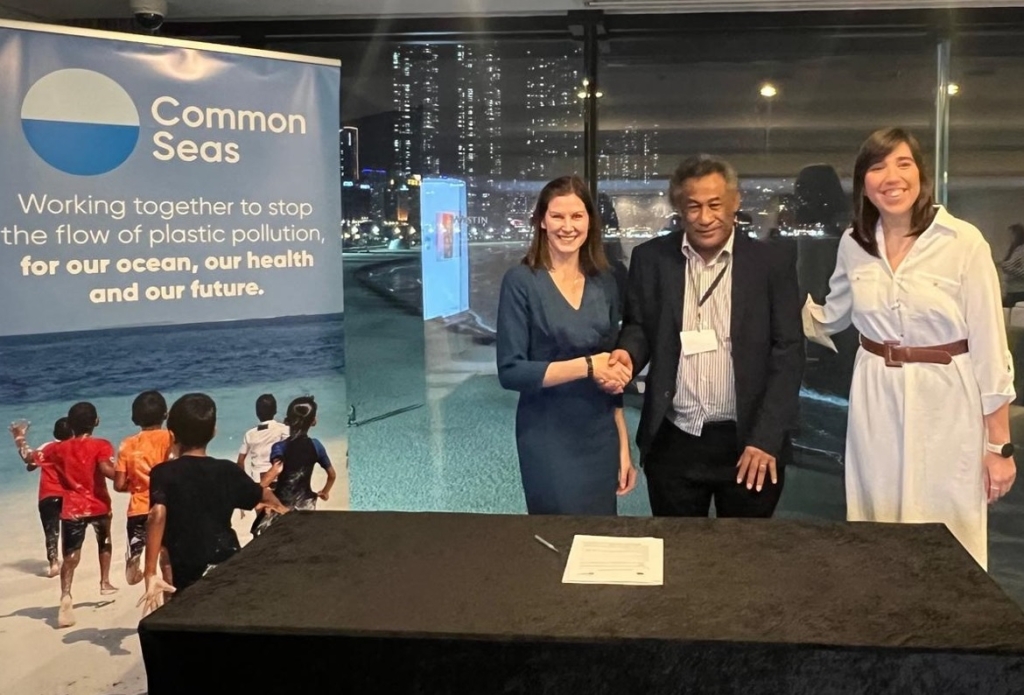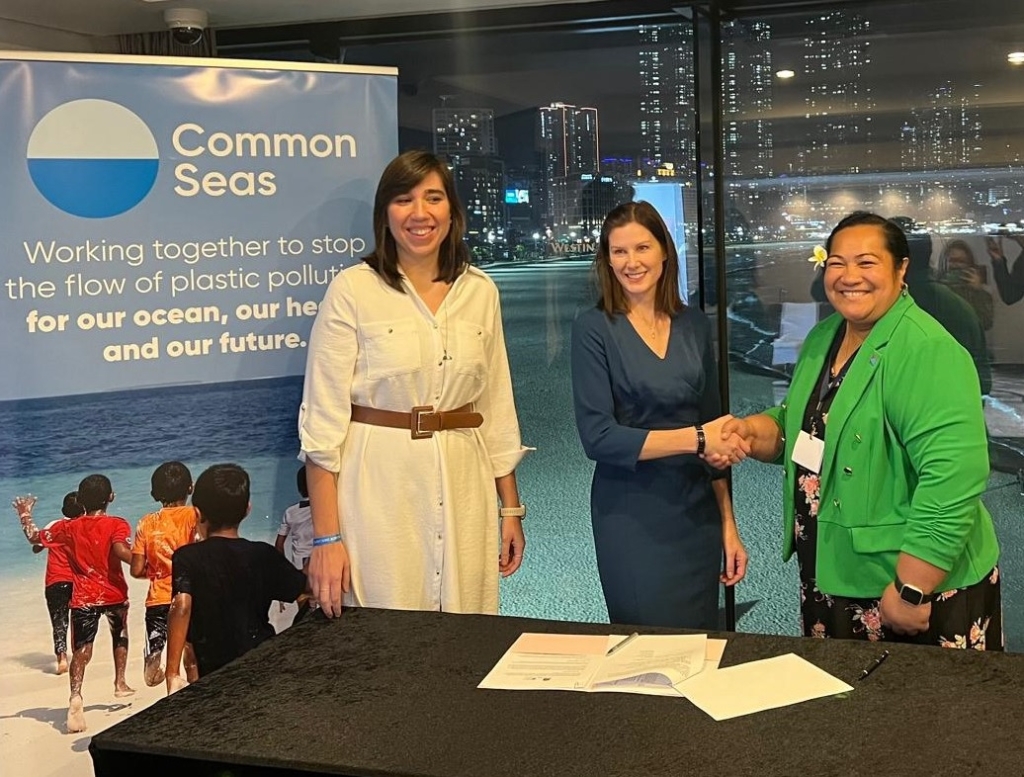
The Pacific Island nations of Papua New Guinea and Tuvalu have taken a step forward in addressing plastic pollution domestically by signing a Memorandum of Understanding (MoU) with the UK-based organisation Common Seas. The signing took place on the margins of the fifth session of the Intergovernmental Negotiating Committee (INC-5) on an international legally binding instrument on plastic pollution, currently underway in Busan, Republic of Korea.
The MoU was signed at the side event co-hosted by Common Seas and the Government of The Gambia on ‘Celebrating and Accelerating Effective National Action in Small Coastal Economies and SIDS’ on Tuesday evening in Busan.
The partnership, facilitated by the Secretariat of the Pacific Regional Environment Programme (SPREP), will enable Papua New Guinea and Tuvalu to develop National Action Plans (NAPs) as part of the anticipated plastics treaty. These plans will provide a roadmap for the two countries for targeted actions to tackle plastic pollution. It will also help the two countries meet their obligations under the future treaty.
“As the largest country both by land and ocean area in the Pacific region and with a population of more than 9 million, Papua New Guinea generates significant amounts of plastic waste and faces serious challenges with mismanaged waste,” said Mr Veari Kula, the Manager of the Infrastructure, Utilities and Convention Branch at PNG’s Conservation and Environment Protection Authority.
Papua New Guinea first attempted to ban single-use plastic shopping bags in 2004, however, this was met with opposition from local industries. “PNG is also a producer of plastics, we manufacture plastic shopping bags in the country, and this is heavily influenced by increased demand from local industries,” Mr Kula said.
Tuvalu, like PNG and other Pacific Small Island Developing States, is disproportionately impacted by the plastic crisis despite the region contributing less than 1.3% of the global plastic pollution.
The island nation which is also a Least Developed Country emphasised the urgency of action.
“We hope that we can finalise and agree on a treaty so we can begin the implementation of that instrument as early as possible,” said Ms. Pepetua Latasi, Tuvalu’s Permanent Secretary for the Ministry of Home Affairs, Climate Change, and Environment.
“The ocean is the lifeblood of our communities and plastic pollution directly affects our people, our food security, and the health of our oceans. We also rely on the ocean for economic development.”

Common Seas is a UK-based organisation that mainly supports government partners with tools and expertise in tackling plastic pollution. The approach includes data gathering, analysis of existing legal instruments, calculating baselines, and implementing the Plastic Drawdown tool.
The tool models the impact of the most effective policy interventions, enabling country partners to make evidence-based decisions in the journey towards reducing plastic pollution.
Through this approach, countries are then able to develop National Action Plans to radically reduce plastic pollution.
“This MoU is a step towards ensuring that we have the tools and resources needed to address this crisis in operationalising the implementation of the treaty,” Ms. Latasi said.
“For countries like Papua New Guinea, we would like to see that the new instrument considers mechanisms to localise implementation at the national level. This is why this partnership with Common Seas has come at a critical time,” Mr Kula said.
“The future instrument should include significant support for Pacific Island nations in the form of technology transfer, capacity-building initiatives, and financing mechanisms. This will help us manage plastic waste effectively and transition to safer, sustainable alternatives.”
 The fifth Intergovernmental Negotiating Committee to develop an international legally binding instrument on plastic pollution, including in the marine environment is taking place in Busan, Republic of Korea, from 25 November to 1 December 2024.
The fifth Intergovernmental Negotiating Committee to develop an international legally binding instrument on plastic pollution, including in the marine environment is taking place in Busan, Republic of Korea, from 25 November to 1 December 2024.
The Pacific Islands are represented by the Cook Islands, Federated States of Micronesia, Fiji, Kiribati, Marshall Islands, Nauru, Niue, Palau, Papua New Guinea, Samoa, Solomon Islands, Tonga, Tuvalu and Vanuatu through the support of the Government of Australia and the United Nations.
They are supported by the Secretariat of the Pacific Regional Environment Programme (SPREP), working with partners the Pacific Islands Forum Secretariat (PIFS), Office of the Pacific Ocean Commissioner (OPOC), The Pacific Community (SPC), Forum Fisheries Agency (FFA), Environmental Investigation Agency (EIA), Centre for International Environmental Law (CIEL), University of Wollongong, WWF and Massey University.
For more information, visit: https://www.unep.org/inc-plastic-pollution/session-5